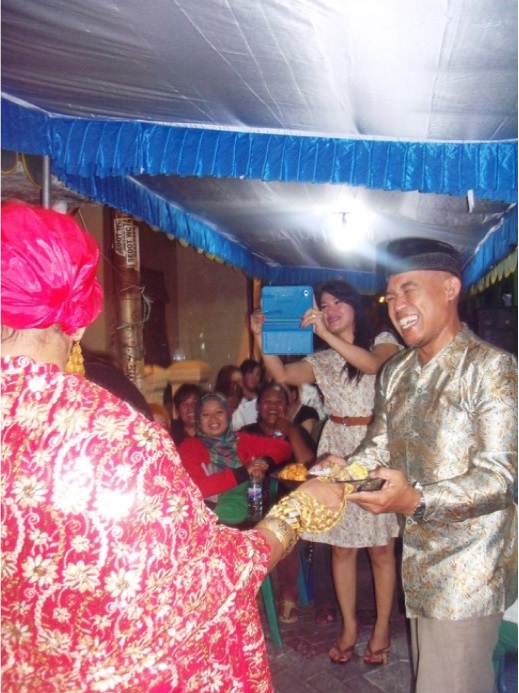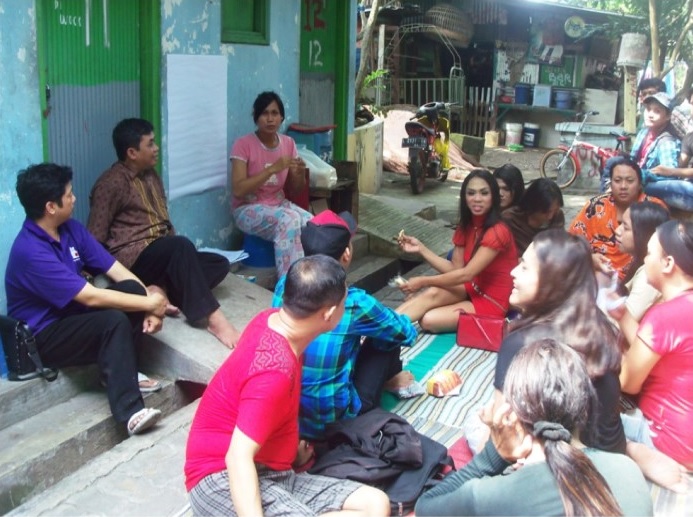People don’t just become waria; they need to be taught and brought into being by a more senior waria
Versi Bh. Indonesia
Irmia Fitriyah
Waria, or transpuan, meaning trans woman, is a portmanteau of two Indonesian words: wanita (woman) and pria (man). While Indonesia has a rich transgender heritage, it is not an easy position to occupy. For instance, the identity card, known as kartu tanda penduduk (KTP), which everyone must carry, only recognises two sexes: male and female. Those who are assigned female at birth must select ‘woman’ for their KTP, and those assigned male at birth must select ‘man’. Living in Indonesia as waria is far from easy.
Becoming waria
I learnt about the concept of nitis (incarnation) from Denok, a waria in her 40s. Nitis is the word she used to describe the journey of becoming waria. Literally, nitis means reincarnation or a hereditary passing down, but she used the term to describe the process of becoming waria; the transformation of someone perceived by society to be male to identifying as waria. More specifically, nitis is used to describe the process whereby an older waria assists in the transformation of a younger person to become waria. Feby, a waria in her late 20s, described nitis to me like this:
‘A waria always has a mbok, which is a Javanese term for mother. The mbok teaches us how to be waria. She will give us advice and accompany us through all of the processes that we need to undertake to become a fully-fledged waria. Just like a traditional mother, our mbok will teach us just like a mother teaches a daughter. She will teach us how to apply makeup and perhaps even she will lend us her bra.’
What I found particularly interesting about the concept of nitis is that it in some ways reframes the heteronormative model of conception and reproduction. Waria understand the concept of nitis as affirming that waria are not born, but that they are incarnated or transformed through instruction. People become waria through a process whereby older waria teach younger waria.
An important part of nitis is learning about body modification from older waria. Waria often talk about the importance of smooth skin that does not show any muscle bulges. Feby mentioned to me that:
‘Skin is the most important part of the body. I would estimate that about three out of every five waria use skin care treatments. Even waria who do not take hormones or get injections to make their breasts bigger use skin care treatments. Every waria wants her skin to shine.’
In addition to skin care treatments, mbok teach their waria students other ways to feminise their body. One popular way to feminise the body is through the use of medical contraceptives. Some mbok recommend that people take the contraceptive pill, or a contraceptive injection, believing that the hormones will feminise the body and reduce masculine physical characteristics.
Becoming waria requires a customary process. Through my engagement with the waria community I learnt that someone always incarnates, or brings about, the waria through a process of nitis. One cannot simply be or become waria on their own.
Being misread
Through the process of nitis, many waria successfully emulate forms of femininity such that they may be perceived as a woman rather than as waria. For example, Linda, a waria in her 20s, tried to renew her KTP. She relayed this story to me:
‘The officer looked at me as if he thought, “Is this a man or a woman?” I then said, in a tense tone, “Yes, that’s me in the photo!” He replied, “But how can a man have long hair like a woman?”’

Irma, a middle-aged waria, had a similar experience of being misidentified when seeking healthcare services.
‘One day, I had to go to the health clinic for a check-up. I registered my name as it is written on my KTP which states that my name is Imam. The clinic staff assumed I was a man because of my registered name. But when she called my name, she was surprised. She said to me with a strange look, “Who are you? We called for Mr Imam”. I said to her, “that’s me”. I always feel uncomfortable in situations like that.’
Another middle-aged waria named Sonya told me: ‘I still feel uncomfortable going to the mall. I can hear people whispering “waria, waria”. For waria, it’s not 100 per cent comfortable going around the city.’
One way that waria try to find comfort in a heteronormative world is by creating bonds of friendship with other waria. Many waria also prefer to live together with other waria. As Sania, a young waria, told me: ‘When I was looking for a place to live, I made sure there were waria living there.’
Another way that waria seek acceptance is by building positive relationships within their local community. However, this has become increasingly difficult since the advent of the LGBT crisis that was triggered by political statements about LGBT groups on university campuses in 2016.
One such example is that, despite receiving no complaints from the local community, the Waria Association of Surabaya (Persatuan Waria Kota Surabaya or Perwakos) was forced to change its name to the Surabaya Organisation for Diversity (Yayasan Ekspresi Warna Surabaya, literally translated as Surabaya Colour Expression Organisation). This was because it could not be legally registered as an organisation if the organisation’s name included the word waria.
Through a process of forming close bonds, mbok incarnate their students to initiate them as waria, and considering the harassment and other challenges waria face in everyday life, this culture of camaraderie is vital – a culture fostered by shared experience, whereby mbok and student find solace in each other.
Irmia Fitriyah (irmia.fitriyah@outlook.com) holds a postgraduate qualification in cultural and literary study from Airlangga University and focuses on gender and sexuality in Indonesia.












